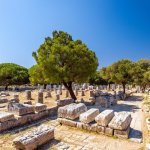Traveling to Greece is a dream for many, conjuring images of stunning beaches, ancient ruins, and vibrant Mediterranean culture. However, experiencing the wonders Greece has to offer doesn’t have to break the bank. Let's face it - it can be expensive to get there - especially if you are traveling from outside of Europe and during peak season. Keeping these tips in mind, though, can help you cut costs.
1. Travel During the Off-Peak Season
One of the best ways to save money while traveling to Greece is by going during the off-peak season, which is typically from October to April. Not only will you benefit from lower prices in flights and accommodations, but you'll also escape the heavy tourist crowds, allowing for a more authentic experience of Greece's beauty and culture.
2. Opt for Lesser-Known Destinations
While Athens, Mykonos, and Santorini are must-visit destinations, Greece is filled with hidden gems that are often overlooked. Consider visiting the Peloponnese region, Meteora, or even the northern part of the country, like Thessaloniki and the Chalkidiki Peninsula. These areas offer breathtaking views, historical sites, and genuine interactions with local culture at a fraction of the cost.
3. Use Public Transportation
Greece’s public transportation system is both efficient and affordable. Ferries can take you between islands at a good rate, especially if you book in advance. On land, buses and trains connect major cities and regions. Utilizing these options instead of renting a car or taking flights can significantly reduce your travel costs.
4. Savor Local Eats
Another great way to save while indulging in the richness of Greek culture is through its cuisine. Avoid tourist traps and opt for where the locals eat. Tavernas and street food vendors offer delicious and authentic Greek food for much less than restaurants in high-traffic tourist areas. Don’t skip on trying the gyros, souvlaki, and the myriad of seafood options.
5. Stay in Budget Accommodations
Greece offers a wide array of budget-friendly accommodations, ranging from hostels to budget hotels and Airbnb listings. Booking in advance can secure you a better deal, especially if traveling during the peak season. Consider staying in a location slightly off the beaten path; you might discover a quaint neighborhood or a breathtaking beach that’s not swarmed by tourists.
Traveling to Greece on a budget is more than feasible with a bit of planning and some savvy travel hacks. By following these tips, you can immerse yourself in the rich history, stunning landscapes, and warm hospitality Greece is renowned for, all while keeping your expenses in check. Remember, the essence of travel is not in how much you spend, but in the experiences you gather and the memories you create.
 Thanks!
Thanks!


